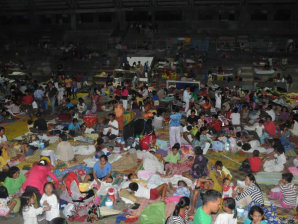MANILA, Philippines – Tens of thousands were forcibly evacuated in several areas as Typhoon “Pablo” (international name Bopha) headed towards land, the National Disaster Risk Reduction and Management Council said Tuesday.
A total of 8,283 families or 41,608 persons were evacuated in Eastern Visayas, Northern Mindanao, Davao and Caraga region.
A total of 11,871 families or 57,501 persons were evacuated in Eastern Visayas, Northern Mindanao, Davao and Caraga region, the National Disaster Risk Reduction and Management Council (NDRRMC) said Tuesday afternoon.
There are 972 evacuation centers as of posting time.
The storm, seen to be the most powerful this year, has also left over 3,000 passengers marooned in ports, the NDRRMC said.
As of latest, there were 3,268 stranded passengers, 148 rolling cargoes, 93 vessels and 49 motor bancas stranded nationwide.
Over 100 flights were grounded due to the storm.
Power outage was also experienced in Tandag, Bislig, Hinatuan, Tagbina, Barobo, Lianga, and Lingig in Surigao del Sur and Carmen, Agusan Del Norte; and Pilar in Surigao Del Norte.
It also prompted authorities to suspend classes in all levels in Mandaue City, Cebu City, Dumaguete City, Caraga region, and selected areas in Davao region.
The following areas were also declared high-risk for storm surge, flooding and landslides:
• Libacao, Kalibo, Numancia, Aklan province
• Hamtic and San Remegio, Antique province
• Maasin, Alimodian, Miga-ao, Tubungan, Leon, Calinog, Mina, Iloilo province
• Sigma, Mambusao, Cuartero, Dao, Capiz province
• San Carlos City, Negros Occidental province
The government, meanwhile, has prepositioned P3.70 million standby funds and P38.64million worth of relief supplies.
Police, coast guard and military teams were also placed on standby for possible deployment.
Pablo made landfall over Davao Oriental early Tuesday.
